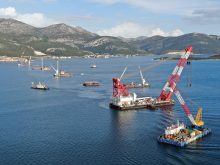Serbia said it signed two road construction agreements with China during the 16plus1 Summit in Dubrovnik, Croatia earlier this month.
The two deals are for construction of the Pozega-Boljare and Novi Beograd-Surcin road routes. The Pozega-Boljare project alone is worth €2 billion and will be financed from the existing loan from the Exim Bank, according to media reports.
China’s east-west Belt and Road Initiative was the focus of the annual 16plus1 Summit that brought together leaders from Beijing plus 16 eastern European countries, including five Western Balkan states. China’s prime minister Li Keqiang was accompanied by an entourage of around Chinese 250 business leaders and politicians.
The
But China’s Belt and Road Initiative appears to be boosting Chinese investment in the region as the less economically well off countries – as well as Italy – are embracing Chinese investment in infrastructure.
But the deals usually come with a hefty price tag and the requirement of Chinese companies to carry out the work.
Many of the countries are not part of the European Union and so have no direct access to EU infrastructure funds. EU enlargement commissioner Johannes Hahn, who oversees bids to join the bloc, reportedly told the French news agency AFP that there are “concerns over the socioeconomic and financial effects some of China’s investments can have”.
Public debt can rise significantly to unmanageable levels in the near future in what is termed debt-trap diplomacy. Government’s that default on loans to China could be forced to hand over assets in lieu of debt repayments.
During the summit, Croatian Prime Minister Andrej Plenkovic and Chinese Premier Li Keqiang visited the site of the controversial Peljesac Bridge to mark completion of the first phase of construction. The 2.4km-long bridge is 55m high at its highest. It is also partly financed by the European Union and the contractor is
When finished it will connect the Croatian mainland with its southernmost region, the Dubrovnik–Neretva County. This will avoid travellers crossing briefly into Bosnia because the country has the area’s sole access to the Adriatic Sea, around the town of Neum.
China Road and Bridge won the tender with a price tag of €279 million. But
Serbia inks two road deals with China at 16plus1 summit
Serbia said it signed two road construction agreements with China during the 16plus1 Summit in Dubrovnik, Croatia earlier this month.
The two deals are for construction of the Pozega-Boljare and Novi Beograd-Surcin road routes. The Pozega-Boljare project alone is worth €2 billion and will be financed from the existing loan from the Exim Bank, according to media reports.
China’s east-west Belt and Road Initiative was the focus of the annual 16plus1 Summit that brought together leaders from Beijing plus





